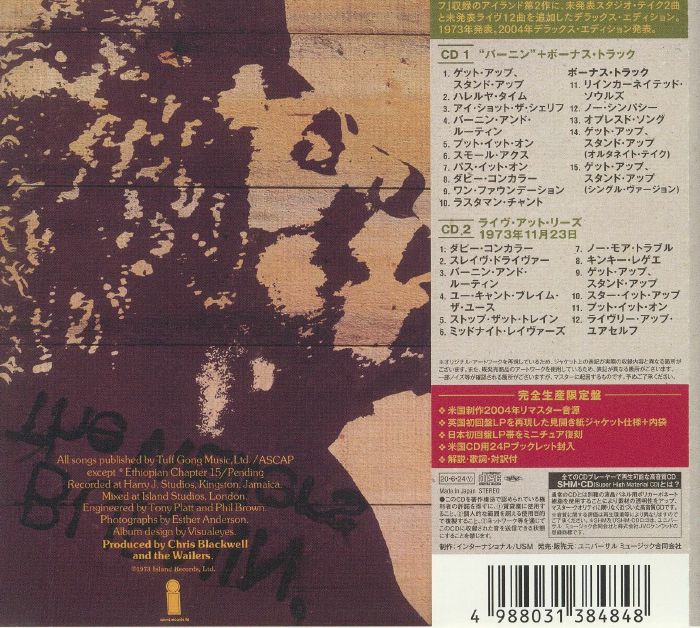

It’s rare that a live record ing becomes the definitive one. Image Credit: Michael Ochs Archives/Getty Images In the words of Chuck D, “This song is a battle cry for survival.” An instant signature, it was a highlight of 1975’s Live! (where Marley added the indelible “wo-yo-yo-yo” chant), and frequently led the battle-hardened troika that capped many of Marley’s late-Seventies concerts, appearing alongside “War” and “Exodus.” It has since been reworked by everyone from Tosh (on his 1977 solo set Equal Rights) to Public Enemy, from Springsteen to Rihanna. One alternate take from the Jamaican sessions had more of a soul groove another, cut in New York in the summer of 1973, when they were in town to play Max’s Kansas City with Bruce Springsteen, had a busier vocal arrangement. But the group worked hard to nail the definitive album version. musicians, Burnin’ presented the Wailers’ sound undiluted, propelled by bassist Aston “Family Man” Barrett and his brother, drummer Carlton Barrett. “I am doing something,” he said, “because I see the exploitation.” The song’s direct, chant-style chorus was further enhanced by the Wailers themselves unlike its predecessor, Catch a Fire, which used overdubs by U.S. Marley had taken a trip to Haiti and witnessed its poverty firsthand, and Tosh was similarly attuned to oppression, particularly in the music business. Marley and Peter Tosh were often at odds about the Wailers’ music (for instance, how many Tosh songs should be featured on their albums), but the co-written “Get Up, Stand Up” was a case of two minds thinking as one. “Get Up, Stand Up” may be the most potent song ever about human rights and the fight to secure them.

Hear most of Bob Marley’s 50 Greatest Songs on Spotify. “His melodies take up a resonance in our minds, in our lives, and that can provide admission to the songs’ meanings… He was the master of mellifluent insurgency.” “Marley sang about tyranny and anger, about brutality and apocalypse, in enticing tones, not dissonant ones,” Mikal Gilmore wrote in 2005. His songs of freedom have become universal hymns. His artistic fearlessness and social commitment remain an inspiration to activists, musical and otherwise. He is a cornerstone of 21st-century music, covered by countless singers, sampled and quoted by just as many hip-hop acts whose artistic DNA is shaped profoundly by the Jamaican music Marley defined. Marley’s stature and influence as a singer, songwriter, and international pop-culture prophet have only grown since those words were written. But, in fact, he was a man with deep religious and political sentiments who rose from destitution to become one of the most influential music figures in the last 20 years.”

In the 1981 Rolling Stone obituary, Bob Marley biographer Timothy White wrote, “The pervasive image of Bob Marley is that of a gleeful Rasta with a croissant-sized spliff clenched in his teeth, stoned silly and without a care in the world. It’s being republished in honor of what would have been Bob Marley’s 75th birthday, February 6th, 2020. In 2007, the album was added to the Library of Congress’s National Recording Registry for its historical and cultural significance.This list was originally published March 28th, 2014. Singer and Rapper Lauryn Hill’s album cover for her debut The Miseducation of Lauryn Hill was inspired by the album cover of Burnin′.

In 2003, the album was ranked number 319 on Rolling Stone magazine’s list of the 500 greatest albums of all time. The songs “Duppy Conqueror”, “Small Axe”, “Put It On” and “Pass It On” are re-recordings of songs previously released.īurnin’ peaked at #151 and #41 on Billboard’s Pop Albums and Black Albums charts respectively. The fourth album by Bob Marley, Peter Tosh and Bunny Wailer (the last before Tosh and Bunny departed for solo careers and the band became known as Bob Marley & the Wailers), Burnin’ opens with a signature song, the call to action “Get Up, Stand Up” and includes a more confrontational and militant tone than previous records, such as in another Marley standard turned into a #1 hit by Eric Clapton, “I Shot the Sheriff”. Burnin’ is a roots reggae album by The Wailers, released in 1973.


 0 kommentar(er)
0 kommentar(er)
